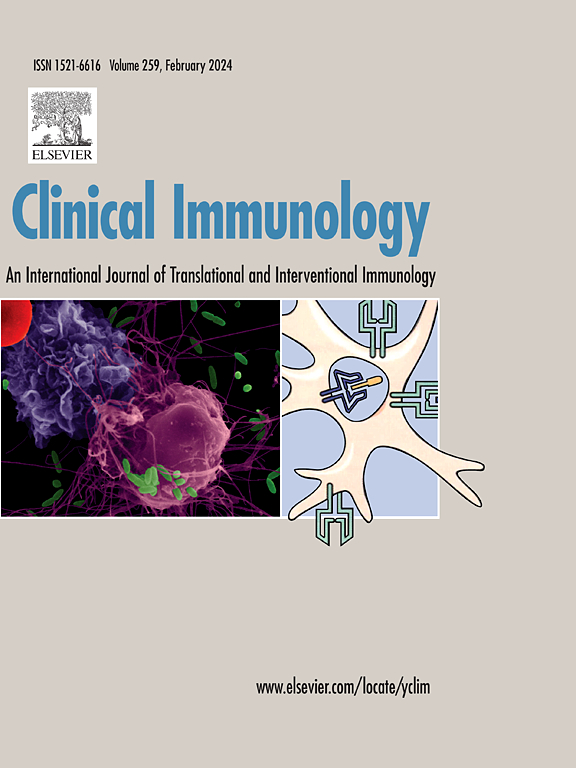Persistent IP-10/CXCL10 dysregulation following mild Omicron breakthrough infection: Immune network signatures across COVID-19 waves and implications for mRNA vaccine outcomes
IF 3.8
3区 医学
Q2 IMMUNOLOGY
引用次数: 0
Abstract
This study explores immune responses in mild Omicron-era COVID-19 breakthrough cases, focusing on cytokine dysregulation, antibody dynamics, and Long COVID. We analyzed samples from 114 mild symptomatic COVID-19 patients across multiple pandemic waves, each dominated by different SARS-CoV-2 variants, at three timepoints: (T1: 2–4 weeks, T2: 3–4 months, T3: 6–8 months post-infection). Persistent IP-10 elevation up to 8 months post–Omicron breakthrough infection suggests sustained low-grade immune activation that appears unique to this wave. Hybrid immunity from Omicron breakthrough infections elicited broad cross-variant antibody recognition but showed declining neutralization over time. Among vaccination regimens, mRNA-inclusive combinations were associated with lower Long COVID scores. CoV-229E antibody levels correlated with Long COVID scores. These findings underscore the need for extended monitoring of even mild COVID-19 cases and highlight the potential of mRNA vaccines in reducing post-COVID-19 complications. Insights into post-infection immune alterations and vaccine effects can inform the development of future vaccination strategies and approaches for managing post-COVID-19 conditions.
轻度组粒突破感染后持续的IP-10/CXCL10失调:跨COVID-19波的免疫网络特征及其对mRNA疫苗结果的影响
本研究探讨了轻度omicron时代COVID-19突破病例的免疫反应,重点关注细胞因子失调、抗体动力学和长COVID。在三个时间点(感染后T1: 2-4 周,T2: 3-4 个月,T3: 6-8 个月)对114例轻度COVID-19患者的多波样本进行分析。IP-10持续升高达8 个月提示低级别免疫激活延长。来自欧米克隆突破感染的杂交免疫提供了广泛的交叉变异抗体识别,但随着时间的推移显示出下降的中和。在疫苗接种方案中,含mrna组合与较低的Long COVID评分相关。CoV-229E抗体水平与Long COVID评分相关。这些发现强调需要扩大对COVID-19轻度病例的监测,并强调mRNA疫苗在减少COVID-19后并发症方面的潜力。对免疫改变和疫苗效果的了解可以为未来疫苗接种战略的制定和covid -19后疾病管理方法提供信息。
本文章由计算机程序翻译,如有差异,请以英文原文为准。
求助全文
约1分钟内获得全文
求助全文
来源期刊

Clinical immunology
医学-免疫学
CiteScore
12.30
自引率
1.20%
发文量
212
审稿时长
34 days
期刊介绍:
Clinical Immunology publishes original research delving into the molecular and cellular foundations of immunological diseases. Additionally, the journal includes reviews covering timely subjects in basic immunology, along with case reports and letters to the editor.
 求助内容:
求助内容: 应助结果提醒方式:
应助结果提醒方式:


